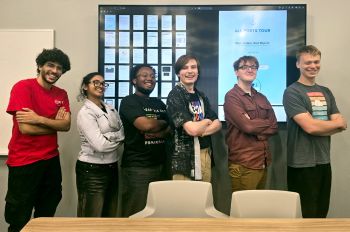Illinois Tech Alumnus Elected to National Academy of Sciences

Illinois Institute of Technology alumnus Jack Dongarra (M.S. CS ’73) has been elected to the National Academy of Sciences for his original research contributions to the field of high-performance computing.
Dongarra’s pioneering contributions to numerical algorithms and libraries have enabled high-performance computational software to keep pace with more than 40 years of hardware improvements.
These accomplishments were recognized by the Association of Computing Machinery when, in 2021, it awarded Dongarra the A. M. Turing Award, the highest honor in computing.
Dongarra began creating code during his time as a student at Illinois Tech while he completed a master’s degree in computer science. His interest in computing was sparked during a final semester undergraduate internship in the Applied Mathematics Research Group at Argonne National Laboratory.
Following his graduation from Illinois Tech, Dongarra was hired full time at Argonne and earned his Ph.D. in applied mathematics from the University of New Mexico while conducting research at Los Alamos National Laboratory. He is currently a member of the distinguished research staff at Oak Ridge National Laboratory (ORNL).
Dongarra returned to Illinois Tech’s campus in April as his alma mater feted his accomplishments that led to his Turing Award. Dongarra presented a lecture, attended a reception, and spoke with students.
Dongarra, who currently sits on Illinois Tech’s Computer Science Advisory Board, specializes in linear algebra, a form of mathematics that underpins many of the most ambitious tasks in computer science, including a critical part of the modeling of many natural systems in physics, astrophysics, climatology, chemistry and biology, human systems in economics, psychology, social science, and engineering. Early in his career, he worked with researchers at several American labs to develop LINPACK, an open-source set of algorithms that help scientists across a wide range of disciplines to do their work. The algorithms benefit a wide range of users through their incorporation into software including MATLAB, Maple, Wolfram Mathematica, GNU Octave, the R programming language, and SciPy, among others—the building blocks of engineering and scientific discoveries.
Dongarra is a member of the National Academy of Engineering and a fellow of several organizations including the American Association for the Advancement of Science, the Institute for Electrical and Electronics Engineers (IEEE), and ACM. He holds appointments at the University of Tennessee, ORNL, and the University of Manchester. He was awarded IEEE’s Sid Fernbach Award in 2004; was the recipient of the first IEEE Medal of Excellence in Scalable Computing in 2008; was the first recipient of the Society for Industrial and Applied Mathematics Special Interest Group on Supercomputing’s award for career achievement in 2010; was the recipient of the IEEE Charles Babbage Award in 2011; and received the ACM/IEEE Ken Kennedy Award in 2013. In 2019 Dongarra received the SIAM/ACM Prize in Computational Science and Engineering, and in 2020 he received the IEEE Computer Pioneer Award for leadership in the area of high-performance mathematical software.
The National Academy of Sciences announced the election of 120 members and 23 international members in recognition of their distinguished and continuing achievements in original research on May 2, 2023. There are 2,565 active members of the National Academy of Sciences.




